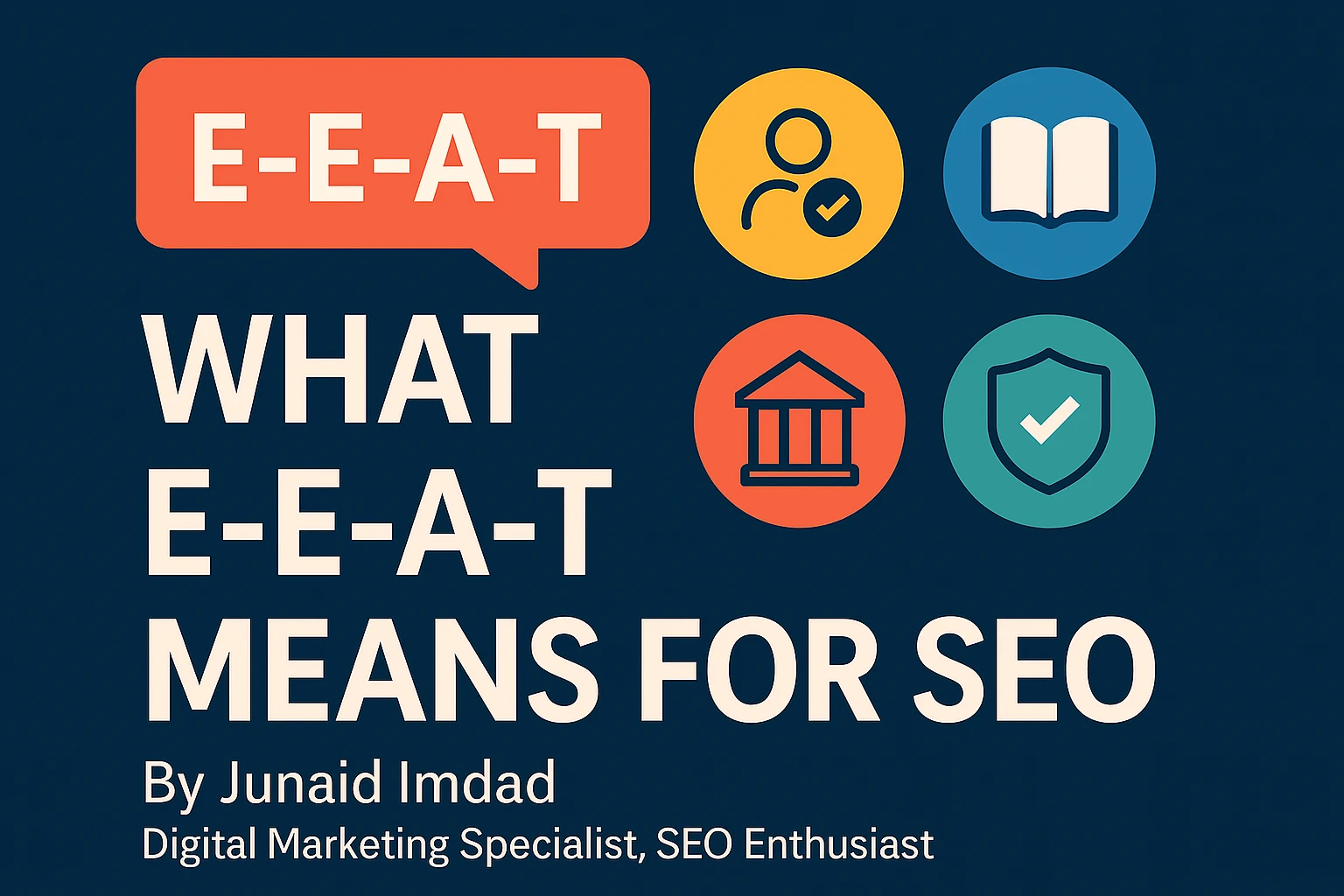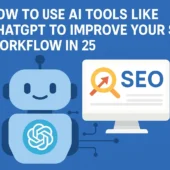By Junaid Imdad, Blogger & Digital Experience Strategist
The year 2025 has made one thing crystal clear for anyone navigating the digital landscape: mastering the nuances of the Google E-E-A-T algorithm isn’t just a nice-to-have—it’s absolutely essential for staying visible in search engine results. In a time when user trust and content authenticity are paramount, Google is putting a stronger emphasis on content that showcases Experience, Expertise, Authoritativeness, and Trustworthiness (E-E-A-T). This shift has dramatically transformed how we need to approach search engine optimization (SEO).
Whether you’re a content creator, a small business owner, a digital strategist, or part of a global marketing team, grasping how E-E-A-T impacts rankings is now crucial for crafting a long-term, sustainable SEO strategy. Google’s ever-evolving algorithms are no longer content with basic signals like keyword density or the sheer number of backlinks. Instead, they’re leveraging advanced AI to assess who’s behind the content, the reasons for its creation, its reliability, and whether it truly benefits users.
In this new environment, every piece of content on your website needs to tackle some important questions: Does it showcase real-world experience? Is it penned or reviewed by someone with the right qualifications or expertise? Is the site a trustworthy source in its field? And most importantly, can users rely on the information provided?
These factors have moved beyond mere best practices—they’re now the bedrock of modern SEO. Websites that don’t align with the E-E-A-T standards are likely to see their organic search performance decline, especially as Google rolls out more AI-driven features like the Search Generative Experience (SGE) and conversational search.
To remain competitive in 2025 and beyond, businesses and creators must adopt a content strategy grounded in transparency, authority, and genuine user value. In essence, understanding and applying E-E-A-T is no longer just a technical requirement; it’s a vital part of thriving in the digital age.
Let’s backtrack a bit and discuss E-E-A-T content and why its significance in today’s digital ecosystem is so pivotal to your success. With the Google E-E-A-T Algorithm shaping how content is ranked and trusted, understanding these principles is no longer optional it’s essential for visibility and credibility online.
What Is E-E-A-T and Why Should You Care?
E-E-A-T, which stands for Experience, Expertise, Authoritativeness, and Trustworthiness, is a framework introduced by Google to help evaluate the quality and reliability of online content. These four principles guide Google’s Search Quality Raters—real people who assess how well web pages fulfill search intent and meet user expectations. In 2025, E-E-A-T is more relevant than ever, especially with the rise of AI-generated content and increasing concerns around misinformation.
The Google E-E-A-T Algorithm places a strong emphasis on content credibility, particularly within YMYL (Your Money or Your Life) topics. These include health, finance, legal advice, safety, and current news—areas where misleading or low-quality content can significantly impact someone’s well-being or decision-making. For example, financial advice from a certified advisor with years of experience will naturally hold more weight than a generic article lacking author credentials or citations.
But E-E-A-T isn’t limited to YMYL niches. Google increasingly rewards content across all industries that demonstrates firsthand experience, specialized knowledge, brand reputation, and ethical transparency. This means showing real-world expertise, citing credible sources, building trust through clear authorship and secure websites, and earning backlinks from respected platforms.
In essence, the Google E-E-A-T Algorithm doesn’t just assess what you say, it evaluates how well you say it, who is saying it, and why users should trust it. Mastering E-E-A-T is no longer optional for SEO success. It’s a foundational part of ranking higher in search results, building user trust, and staying competitive in today’s digital ecosystem.
Here’s a closer look at each element:
Experience:
When evaluating content, one of the most important factors in the Google E-E-A-T Algorithm is the author’s real-world experience. Google now places significant weight on first-hand knowledge. For instance, a travel blogger who has actually visited the destinations they write about is far more credible than a generic writer pulling information from secondhand sources. First-hand experience not only builds trust but also enriches content with authentic insights that resonate with readers and the algorithm notices.
Expertise:
Another key consideration within the Google E-E-A-T Algorithm is whether the author possesses formal qualifications or professional experience in their field—such as relevant degrees, certifications, or years of hands-on industry work. These credentials signal authority and reliability, helping content stand out in competitive search rankings.
Authority:
A critical aspect of the Google E-E-A-T Algorithm is assessing whether the site or individual is recognized as an authoritative source. This often shows up through high-quality backlinks, brand mentions, and citations from other respected voices in the industry.
Trustworthiness:
To meet the expectations of the Google E-E-A-T Algorithm, your website must demonstrate transparency, honesty, and accuracy. Both your visitors and Google need to trust that your content is factual, secure, and created with integrity.
The Google E-E-A-T Algorithm is designed to ensure that search results deliver genuine value—especially when users are making decisions that affect their health, finances, or overall wellbeing.

Google E-E-A-T Algorithm in 2025
With the rapid advancements in artificial intelligence (AI), natural language processing (NLP), and machine learning, we’re seeing a shift in how algorithms assess content. It’s no longer just about the words on the page; it’s about understanding the nuances of how something is written, who the author is, and the purpose behind it. Google is now on the lookout for signs of genuine understanding, originality, and intent, giving more weight to content that showcases real-world experience and expertise in the subject matter.
Gone are the days of shallow blog posts stuffed with keywords and generic tips. By 2025, achieving a high ranking in search results will require more than just technical SEO skills—it will demand a strong focus on quality, authenticity, and delivering real value to users. The E-E-A-T framework—Experience, Expertise, Authoritativeness, and Trustworthiness—has evolved from a mere guideline to the foundation of effective SEO.
To stay competitive, websites need to create content that is not only informative but also transparent, credible, and driven by purpose. This means referencing trustworthy sources, clearly stating who wrote the content and their qualifications, and offering unique insights based on genuine industry knowledge or personal experiences. Google is favoring content that empowers users to make informed choices, whether it’s through a comprehensive how-to guide, a thought-provoking article, or an in-depth review from someone who has actually used the product or service.
For marketers, content creators, and business owners, this change signifies a significant strategic shift. It’s no longer about trying to outsmart the system; it’s about building trust. In essence, the modern SEO landscape is being redefined by a new standard, with Google’s E-E-A-T algorithm at the forefront, pushing us toward a more authentic and user-centered web.
Let’s examine how each aspect of E-E-A-T has an impactful SEO presence this year:
1. Experience Is Now Differentiator
Experience has become so much more than just a trendy term under the Google E-E-A-T Algorithm—it’s now a vital ranking factor that plays a direct role in how well content performs in search results. By 2025, Google is putting a strong focus on whether content truly reflects authentic, real-world insights instead of just being a bland or recycled summary of what’s already out there. This change aligns with Google’s larger mission to connect users with genuinely helpful and trustworthy content created by individuals who have real-life experience with the topics they’re discussing.
This is especially crucial in fields where credibility and accuracy can lead to serious real-world implications, like healthcare, financial planning, legal issues, and personal safety. In these so-called Your Money or Your Life (YMYL) categories, Google’s algorithms are designed to prioritize content that demonstrates firsthand experience—whether it’s a medical professional outlining treatment options, a financial expert sharing market strategies, or a legal advisor offering practical, case-based insights.
To meet these new standards, content creators and businesses need to step up their game beyond just surface-level blog posts or AI-generated summaries. They should strive to enrich their work with personal stories, case studies, client experiences, expert quotes, or professional insights that reflect genuine experience. Even in less sensitive fields—like tech, travel, or product reviews—Google favors content that feels authentic and is backed by real experience, helping users trust what they read and engage with it on a deeper level.
In short, showcasing lived experience is no longer just a nice-to-have—it’s a competitive edge. As Google continues to refine its understanding of content quality, creators who can demonstrate that they’ve been there, done that, and gained valuable insights along the way are much more likely to gain visibility, authority, and the trust of their audience.
Example: Under the Google E-E-A-T Algorithm, a personal finance blog offering real-life budgeting advice drawn from the author’s experience of paying off debt will typically rank higher than an affiliate article lacking personal narrative or lived context.
Pro Tip: To align with the Google E-E-A-T Algorithm, integrate personal narratives, case studies, and lessons learned into your content to showcase real-world experience. Let your authentic voice shine through, it’s part of what makes your content credible and valuable.
2. Expertise Must Be Proven, Not Claim
In 2025, simply calling yourself an expert just doesn’t cut it anymore in the ever-evolving search landscape. Thanks to the updated Google E-E-A-T Algorithm—which stands for Experience, Expertise, Authoritativeness, and Trustworthiness—having verifiable credentials is now essential, especially for YMYL (Your Money or Your Life) content. This type of content can significantly affect someone’s health, financial security, safety, or overall well-being, and Google has really upped the ante on what it considers trustworthy information in these areas.
If you’re dishing out medical advice, financial tips, legal guidance, or mental health support, Google is scrutinizing not just your words but also your identity and qualifications. Content that doesn’t back up its expertise—like author bios without credentials, sites lacking clear editorial oversight, or advice from anonymous or unqualified sources—will struggle to rank well.
To align with these new expectations, content creators and businesses need to make sure that authorship is clear and credentials are both visible and credible. This could mean showcasing degrees, certifications, years of experience, professional titles, links to published work, or connections with respected organizations. Google’s algorithm is increasingly on the lookout for external validation—like mentions in reputable publications, backlinks from trustworthy sites, and a consistent online presence across various platforms—as indicators of legitimacy and true expertise.This includes qualifications such as:
- Academic Qualifications | Work History | Publications or Speaking Events (or V.I.P)
- Collaboration with other experts
Example: Content written or reviewed by a certified physician sends stronger expertise signals under the Google E-E-A-T Algorithm, helping it rank higher in health-related search results due to its credibility and trustworthiness.
Include author bios, qualifications, and structured data markup (such as Schema.org) to convey E-E-A-T SEO Google values clearly.
3. Authoritativeness Is Acquired From Community Recognition
Authoritativeness must be earned, rather than claimed; Google assesses this through different metrics:
Brand Searches (people searching your site by name) High-Quality Backlinks [Pages with excellent backlinks pointing back] [People Googling your website directly ] (Pages that link directly back) ]
- Positive reviews and testimonials.
- Please visit these reputable platforms to be recognized on them.
Example: Receiving links or mentions from Ahrefs or Moz is a powerful indicator of trust; your authority will grow with each time someone else endorses your content.
Investment in digital PR, networking and relationship-building with credible sources will enhance E-E-A-T optimization.
4. Trustworthiness Is Key
Without trust, nothing else matters. Under the Google E-E-A-T Algorithm, a website lacking clear contact information, transparency, or secure browsing won’t rank well—regardless of how strong its written content may be.
- Checklist of Trust: Clean your cookies regularly using HTTPS (secure browsing).
- Include customer contact and service details.
- Have clear disclaimers and editorial policies.
- Referring to credible sources is crucial when providing evidence-based arguments.
- Avoid misleading claims made through clickbait websites and ads.
Utilize an effective E-E-A-T SEO audit process to quickly detect any gaps in trust signals and address them quickly.

Conduct a monthly E-E-A-T SEO Audit: Your 2025 Checklist
Conducting a regular E-E-A-T SEO audit is crucial in 2025 to ensure your content aligns with the evolving Google E-E-A-T Algorithm. As Google becomes more sophisticated in evaluating content credibility, trustworthiness, and author expertise, maintaining high standards isn’t optional—it’s essential. Below is a comprehensive E-E-A-T audit checklist to help future-proof your content and preserve your rankings:
Content and Authors:
Provide clear author bios that clearly state their qualifications.
Link to author social profiles or professional portfolios.
Display publication and last update dates
Highlight real world experience (personal stories, images and case studies).
Technical SEO:
- Utilize Schema markup for authors, reviews and products.
- Check mobile-friendliness and page speed
- Use canonical tags to prevent duplicate content.
Reputation & Links:
- Create backlinks from authoritative domains by building backlinks from them.
- Encourage brand mentions in articles, podcasts and interviews
- Use HARO or press release outreach to increase recognition.
- Monitor reviews and respond to feedback (Google, Trustpilot, etc).
Site Trust Signals:
- Communicate privacy policies, terms of usage agreements and disclaimers on your website to build credibility with visitors.
- Display contact and support details
- Do not use too many ads or popups on your site.
- Avoid clickbait titles or false claims
Final Thoughts: People First in 2025
One undeniable truth at the heart of SEO services in 2025 is that people come first. The days of focusing solely on keywords, backlinks, and metadata to climb search engine rankings are long gone. Nowadays, especially with Google’s ever-evolving algorithms, the emphasis has shifted significantly from merely optimizing pages for search engines to crafting content that genuinely resonates with real people. This change isn’t just a matter of philosophy—it’s a fundamental shift in how algorithms operate, and it’s here to stay.
In 2025, Google is all about prioritizing people over pages. Their algorithms, including the sophisticated E-E-A-T framework (Experience, Expertise, Authoritativeness, and Trustworthiness), are increasingly designed to reward content that truly serves users. Whether someone is on the hunt for financial advice, health tips, educational resources, or product recommendations, what really matters is that your content meets their real-life needs in an accurate, transparent, and authentic way.
This means that SEO professionals, content creators, and digital marketers need to stop viewing SEO as just a technical checklist and start seeing it as a human-centered strategy. You need to show that your content is rooted in real experiences. You have to prove that your voice carries credibility in the subject matter. You must establish your site as a trustworthy source of information—and you need to do all of this while being transparent, empathetic, and genuinely helpful.
By adopting this human-first approach, your content will not only attract search engines but also resonate with your audience, build trust, and foster sustainable organic growth. Trust is the real currency of SEO in 2025. The more your strategy aligns with E-E-A-T principles, the better your content will be received, both by users and by Google.
In a nutshell, achieving SEO success in 2025 isn’t about chasing after algorithms—it’s about serving people. The brands that grasp this shift and weave it into their SEO strategies are the ones that will rise to the top of search results and maintain their position there.
E-E-A-T for SEO does not entail exploiting loopholes – rather, it involves producing content which merits ranking well in organic search results.
- So next time you’re planning a blog post, pose this question to yourself:
- Can I have experience in this?
- Am I qualified to discuss this subject matter?
- Does my website project authority and transparency?
If the answer to both of those questions is in the affirmative, your content has gone beyond simply being optimized; it has become truly valuable.
Let’s Discuss E-E-A-T Optimization
Need Help Optimizing E-E-A-T SEO? I have helped brands of all sizes run detailed audits, create authority driven content, and enhance user trust. Reach out with any comments, messages or schedule a call–I’d love to assist your site in expanding in a sustainable fashion!
If you want to get info about Ai versus human content, simply click on it.

Would you like a printable E-E-A-T checklist PDF, or an editable content audit template to get started with E-E-A-T? Just let me know, and I’ll provide them to you!
By Junaid Imdad, Blogger & Digital Experience Strategist




Google's 2025 Helpful Content Update: What You Should Change Right Away - Devitcity
[…] E-E-A-T [Electronic Environmental Affairs and Test], this still matters more than […]
Artificial Intelligence Versus Human-Written Content: Which Will Perform Better for Ranking in 2025? - Devitcity
[…] recognizes that AI may help produce content more rapidly; however, its increased emphasis on E-E-A-T suggests they want to surface material which demonstrates credibility, depth, and real […]
Generative Engine Optimization (GEO) and Why it Is the Future of SEO in 2025 - Devitcity
[…] you want to get info about E-E-A-T in SEO, simply click on […]
How to Use ChatGPT & AI Tools to Boost SEO Workflow (2025 Guide) - Devitcity
[…] What E-E-A-T Means for SEO in 2025 to strengthen trust and authority in your content. […]
How to Optimize Your Website for Mobile-First SEO in 2025 – Boost Speed, UX & Rankings - Devitcity
[…] For authority building: The Google E-E-A-T Algorithm Explained […]
FlexClip Review 2025: The Best AI Video Editing Tool for Marketers and Beginners - Devitcity
[…] Enhance your credibility with The Google E-E-A-T Algorithm Explained […]
AI Content vs Human Writing: The Ultimate SEO Showdown in 2025
[…] E-E-A-T Deficiencies: […]